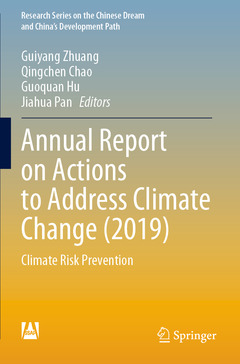Description
Annual Report on Actions to Address Climate Change (2019), 1st ed. 2023
Climate Risk Prevention
Research Series on the Chinese Dream and China’s Development Path Series
Language: English
Subjects for Annual Report on Actions to Address Climate Change (2019):
Publication date: 01-2024
246 p. · 15.5x23.5 cm · Paperback
Publication date: 01-2023
246 p. · 15.5x23.5 cm · Hardback
Description
/li>Contents
/li>Biography
/li>Comment
/li>
This book highlights China?s theoretical advances and practical actions toward climate risk prevention in 2019. It provides both an overview and detailed discussion of specific topics, including case studies. The general report assesses the latest changes in the climate system both globally and in China, and identifies areas most susceptible to the impact of climate change. This is followed by topical reports on issues such as global climate governance, China?s strategy in climate negotiations, the carbon trade, climate insurance, domestic actions to address climate concerns, including specific solutions to local challenges and achievements made by cities in China. Written by top experts in the field from Research Institute for Eco-civilization of Chinese Academy of Social Sciences and National Climate Center of China Meteorological Administration, the book aims to inform the readers on recent development and progress in climate risk prevention.
Qingchen Chao is a research fellow and director of the National Climate Center of China Meteorological Administration. Chao's research interests include the analysis and interaction of climate systems, and climate risk management.
Guoquan Hu is associate researcher at the National Climate Center of China Meteorological Administration. Hu's research interests include climate change data simulation and climate change adaptation strategies.
Jiahua Pan is a Member of Chinese Academy of Social Sciences (CASS), and professor of economics and director of Institute of Ecocivilization Studies, Beijing University of Technology. Pan's research interests include the global economy and the economics of climate change.
Provides a comprehensive overview of climate changes in China
Covers the leading scholars in the field of environment in China
Presents China’s policy suggestions for combating climate change
These books may interest you

China's Climate Change Policies 53.83 €

China's Climate Change Policies 160.25 €

Climate Risk and Resilience in China 160.25 €

